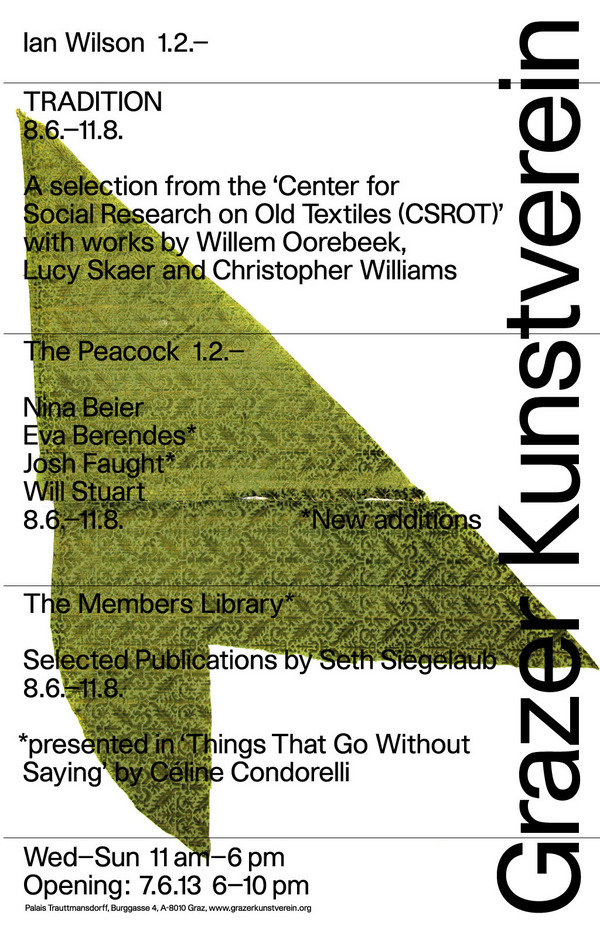Tradition
dal 7/6/2013 al 10/8/2013
Segnalato da
7/6/2013
Tradition
Grazer Kunstverein, Graz
Seth Siegelaub and The Center For Dying On Stage. A selection from the Center for Social Research on Old Textiles (CSROT) with works by Willem Oorebeek, Lucy Skaer and Christopher Williams.

curated by Krist Gruijthuijsen and Maxine Kopsa
A selection from the Center for Social Research on Old Textiles (CSROT) with works by Willem Oorebeek, Lucy Skaer and Christopher Williams
The Grazer Kunstverein continues its exploration within the realms of social abstraction, by presenting a selection of the elaborate collection of historic textiles assembled by Seth Siegelaub (b. 1941, US) for the Center for Social Research on Old Textiles. Currently comprised of around 650 pieces, the collection includes woven and printed textiles, embroideries and costume, ranging from fifth-century Coptic to Pre-Columbian Peruvian textiles, late medieval Asian and Islamic textiles, and Renaissance to eighteenth-century European silks and velvets. At Marres, a selection of 50 items will be shown alongside art works. The exhibition follows The Stuff That Matters at Raven Row (London) in 2012, which marked the collection's first public presentation.
After running his own gallery in New York from 1964 to 1966, Seth Siegelaub played a pivotal role in the emergence of what became known as Conceptual art, which resulted in a series of 21 art exhibitions in groundbreaking formats he organized between 1968 and 1971. In 1972 he turned away from art and moved to Paris, where he published and collected leftist books on communication and culture, and founded the International Mass Media Research Center. In the early eighties he began collecting textiles and books about textiles and in 1986 founded the Center for Social Research on Old Textiles, which conducts research on the social history of hand-woven textiles. In 1997 he edited and published the Bibliographica Textilia Historiae, the first general bibliography on the history of textiles, which has since grown online to over 9,000 entries.
The intimate relationship between textiles and society can be seen, as Siegelaub explains, in the fundamental role textile played in the rise of the capitalist system and the industrial revolution. While the form and aesthetics of textiles in general are determined by the way they are manufactured, the selection of items in the exhibition at the Grazer Kunstverein are specifically based on the abstraction of forms in relation to function. Amongst the items on display will be Barkcloth (tapa) and headdresses from the Pacific region (especially Papua New Guinea) and Africa.
The textiles in the exhibition will be shown alongside the works of three artists, Willem Oorebeek, Lucy Skaer and Christopher Williams, whose conceptual work reflects on notions of craftsmanship, industrial (re)production, modernity, appropriation and representation.
An essay by artist and writer Doug Ashford is published for the occasion.
Tradition is the result of a collaboration between Marres, Centre for Contemporary Culture, Maastricht, Kunstverein, Amsterdam and Grazer Kunstverein, Graz, Austria.
The Members Library* presents
A selection of publications produced by collector, researcher, and curator Seth Siegelaub.
Seth Siegelaub was a seminal figure in the Conceptual art movement of the 1960s and 1970s. His curatorial work took place both in physical spaces and, most significantly, in the form of books, in which he redefined the exhibition catalogue itself as the exhibition. Siegelaub's approach mirrored the Conceptual art movement by raising important questions about the making, display, ownership, distribution, and selling of works of art. Alongside a selection of these publications, a collection of books on textiles also produced Siegelaub will be presented.
*The Members Library is constructed and designed by artist and architect Céline Condorelli in collaboration with Harry Thaler as a permanent work titled Things That Go Without Saying.
The Centre For Dying On Stage
The Grazer Kunstverein is thrilled to announce the inauguration of The Centre For Dying on Stage, an ephemeral research residency venture exploring the spectacle of death caused during a performative state. The centre structures, archives, commissions and presents undertakings that investigate notions around death and the stage by looking at cases of those such as Molière, Felix Mottl, Alexander Woolcott, Johnny Ace, Tyrone Power, Harry Einstein, Eduard van Beinum, Leonard Warren, Paul Mantz, Nelson Eddy, Joseph Keilberth, George Ostroska, David Burns, Jerome Rodale, Leslie Harvey, Irene Ryan, Carl Barnett, Chris Chubbuck, Sid James, Cyril Ritchard, Karl Wallenda, Bill Stewart, Arnold Soboloff Ron Watson, Renato Di Paolo, James Tuozzolo, Giuseppe Sinopoli, John Ritter, Gordon Reid, Darrell Abbott, Francesco Scoglio, Craig Ewert, Steve Irwin, M.N. Vijayan, Jose Fernando Castro Caycedo, Miriam Makeba, and, more recently, Jeroen Willems.
The Centre's first researcher is Kate Strain, an Irish curator based in Dublin. Kate has been asked to structure the content and archive of the centre including its website.
Opening 8 June
Grazer Kunstverein
Burgergasse 4/II, Graz
Opening Hours: Wed–Sun 11am–6pm
Admission free



